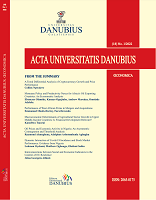The Impact of Exchange Rate Volatility on Credit Risk in South African Banking Portfolios
The Impact of Exchange Rate Volatility on Credit Risk in South African Banking Portfolios
Author(s): Margaret Rutendo Magwedere, Joseph ChisasaSubject(s): Business Economy / Management, Economic development, Financial Markets, Socio-Economic Research
Published by: Editura Universitară Danubius
Keywords: Exchange rate; credit risk; cointegration; information asymmetry; South Africa;
Summary/Abstract: Macroeconomic shocks affect loan defaults in the credit markets. The South African rand has been volatile with low economic growth and high unemployment. The objective of this paper was to determine the impact of exchange rate volatility on credit risk in South African banking portfolios. Imperfect information, deflation and utility theories formed the theoretical foundation of the study. Additionally, empirical literature consulted demonstrated inconclusive findings on the nexus between macroeconomic factors and credit risk. Cointegration and error correction models were applied on timeseries data to determine the impact of selected macroeconomic variables on credit risk. The results show that macroeconomic shocks significantly affect bank asset quality. A 1% increase in exchange rate increases impaired loans by 0.57%. Based on these observations, it is evident that the exchange rate variability affects the loan portfolio default risk via its positive or negative influence on obligor cashflows. This article is valuable for banking sector stability; hence, policymakers should understand macroeconomic fundamentals that significantly affect bank asset quality. Further research is recommended at sectoral level.
Journal: Acta Universitatis Danubius. Œconomica
- Issue Year: 19/2023
- Issue No: 2
- Page Range: 300-314
- Page Count: 15
- Language: English

